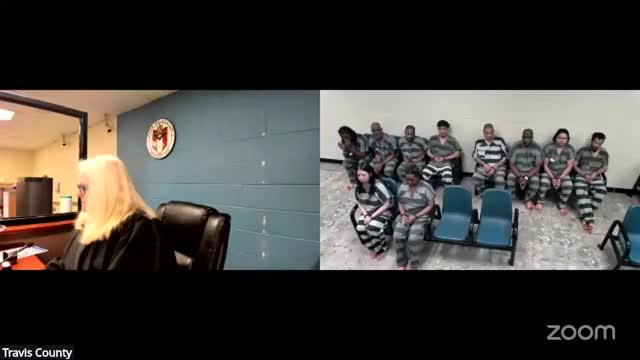Travis County judge reviews rights and sets bail, bond conditions for multiple defendants
Get AI-powered insights, summaries, and transcripts
Subscribe
Summary
At a magistrate session in Travis County Court, Judge Pam Siegman reviewed constitutional rights, explained bond options and set bail or personal-bond conditions for several defendants, including emergency protection and no-contact terms for at least one case.
Judge Pam Siegman presided over a magistrate session in Travis County Court during which she read defendants their rights, explained release options and set bail or personal-bond conditions for multiple defendants.
Siegman told the group, "You have the right to remain silent. You don't have to say anything today or at any time about your case," and explained representation by counsel and that an appointed lawyer is available if a defendant cannot afford one. She also summarized release options: "There are basically 3 ways to get out of jail. A cash bond, a surety bond, or a personal bond."
Why it matters: magistrate hearings determine initial conditions for release and can impose immediate constraints—such as no-contact orders, firearm prohibitions or electronic monitoring—that affect defendants' liberty and pretrial supervision.
The court set specific bail amounts and conditions in several cases. For example, Angel Martinez, charged with a Class A misdemeanor assault involving family violence, had bail set at $5,000 and an emergency protection order (EPO) requiring no contact with the complaining witness and a 200-yard stay-away from the listed Dessal Road address; the EPO also prohibited firearm possession and runs until April 2025. The judge told Martinez the bond conditions remain in effect until the case is resolved or altered by a judge.
Other specified outcomes included: Alejandro Medina, charged with multiple felony counts including second-degree assault on a peace officer, had bail set at $5,000 on each of two counts (totaling $10,000) and was informed he may be ineligible for a personal bond on some charges; Christopher Elmore, charged with a first-degree manufacture/delivery offense, had bail set at $20,000 with conditions including placement on electronic monitoring and required participation in pretrial drug evaluation and supervision; and defendants charged with driving while intoxicated were repeatedly told they must install an interlock device within 30 days of release.
The judge frequently noted limits on personal bonds where the law or the allegations prohibit them. On those occasions she advised defendants that they could confer with an attorney about seeking bond reduction or a personal bond later. She also explained bond mechanics: a cash bond is refundable upon compliance with court obligations, while a surety bond generally requires payment of a nonrefundable fee to a bondsman ("usually 10 to 20% of your bail amount").
Magistration also addressed supervision and court appearance obligations. For some defendants the court added pretrial supervision or a requirement to reside at a specified address as a condition of a personal bond. In one case the judge granted a personal bond tied to supervision and a residence requirement for Janesia Hill. Several defendants were told a court-appointed lawyer would be assigned and that the lawyer should contact them within a few days.
The session included procedural clarifications: how to post bond (including use of a bail bond company), that out-of-state payments may require coordination with the bondsman, and that release processing may take several hours depending on workload. Siegman repeatedly urged defendants to discuss factual questions and case strategy with counsel rather than on the record.
The magistrate hearing concluded after the judge reviewed each defendant's charges, penalties and bond conditions, emphasizing promises to appear and the consequence of warrants for failure to appear. Several defendants were given personal bonds; others were required to post set amounts or consult counsel about possible reductions. The judge also advised defendants who planned to post bond to tell the jail post officer they wish to use the phone to make arrangements.
